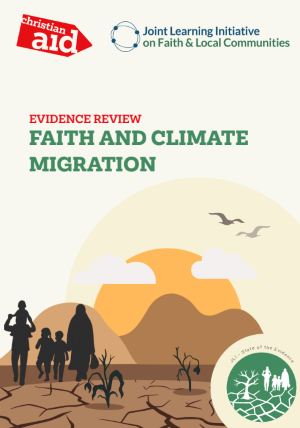Evidence Review on Faith and Climate Migration

How is climate migration understood by local faith actors? How do they perceive, engage and support people displaced by climate change?How do religious or spiritual narratives beliefs, practices shape the lived experiences of climate migration?
Around the world, rising seas, shifting rainfall patterns, flooding, droughts, and heatwaves are forcing people to leave their homes, with profound human consequences, affecting livelihoods, health, identity, and stability.
The Evidence Review on Faith and Climate Migration report, launched by the Joint Learning Initiative on Faith and Local Communities (JLI) and Christian Aid explores the often overlooked role of faith actors and communities in this growing crisis – material aid but also emotional support, spiritual guidance, and a sense of belonging for those facing displacement.
The report brings together a comprehensive literature review and insights from listening dialogues held in South Asia, East Africa, and Latin America and the Caribbean (LAC), highlighting both the vital contributions of faith actors and the support they need to continue their work.
The report offers journalists covering faith, climate and migration story ideas and tools for their reporting, including an extensive bibliography. It focuses on the terms employed to describe people who are displaced due to a climate change, and their social, political, and legal implications and on ways religion and faith actors engage with climate action and environmental sustainability.
The report explores key themes in faith and climate migration: religious and spiritual losses, support from local faith actors, faith-based advocacy and practitioner responses, as well as barriers to climate migration.
Read more and Download the full report in English, French and Spanish
The findings of the report will be further explored in the Online Symposium Faith at the Frontlines of Climate Migration, on 23 October 2025 (2:30–5:30 PM BST / GMT+1), where global voices will discuss the role of faith in responding to climate-induced migration.
